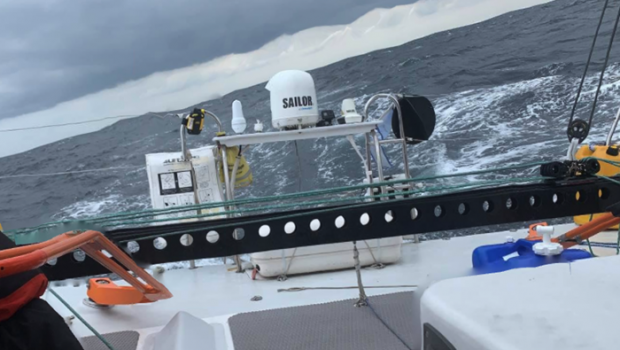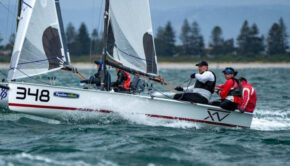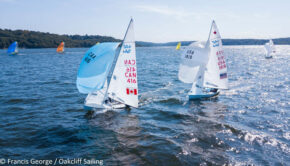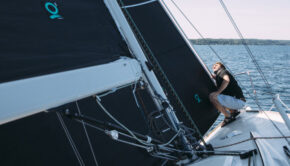Getting an education in offshore sailing
Published on August 18th, 2020
For the 65 boats that started the 2020 Ida Lewis Distance Race on August 15, they were greeted by a building northeasterly that dished out 20-22 knots of breeze throughout most of the day and into the evening and overnight.
Oakcliff Sailing had two teams entered that were looking for an education… and they got it. Executive Director Dawn Riley provides the report:
It was wilder and woolier race than most forecasts predicted. While generally a quick out and back from Newport, RI, offering a ’nice intro’ into offshore sailing for family, friends, and kids, this year was a bit more than that.
Ida Lewis Yacht Club had included a new inshore course in addition to their offshore route this year with a special focus on double-handed racing. We sent our Class40 in the double handed division with two graduates aged 18 and 19.
We also entered our new-to-us C&C 30 in the offshore course with two staff and six Saplings on board. She and her team had raced offshore in Maine’s Mohegan Island Race and completed the delivery down to New Bedford, MA but both were quite light air affairs. In the Ida Lewis Distance Race, our team found the limits of a C&C 30 racing offshore.
At 4:11 pm on August 15 we got a call at Oakcliff base from the US Coast Guard (USCG) telling us the C&C 30’s EPIRB was going off. Between the three of us in the office, we immediately emailed, texted, called, WhatsApped and Facebook messaged every person on board.
We then made contact with the Class40, they asked for the lat-long of the C&C 30’s last Yellowbrick ping, and went to call on VHF 16 and the Race Committee Channel in hopes of making direct contact or to relay a message through the fleet.
The C&C 30s last known position was on the windward side of Block Island with an average speed of 12 knots… fast for a C&C 30. At this point I struggled with every parent’s conflict. They are offshore and safe and it must have been an accidental deployment and EPIRBs don’t often go off accidentally and they are in pretty rough conditions and why can’t I be in immediate cellphone contact!
Two worst-case disaster scenarios went through my mind: They all do a great job of being clipped in and the boat went down the mine and they are sinking. Or – they have lost their mast and are drifting towards the rocks.
As I was spiraling down that path, we got an updated ping so we knew they were floating but that they also should have been in close enough contact to Block Island to get cell phone reception and they were all young enough that cell phones are practically part of their body so why could we not reach them?
The Class40 called back to base to report that, after our initial call, they had immediately diverted their course to the last known location but were about an hour out and had not been able to raise anyone on the VHF, possibly due to range or possibly that it is hard to hear VHF’s on deck in those conditions.
In the meantime, we reached out to the race organizers to keep them in the loop and ask if any competitors had called into them with any more information, but got no response from any of the calls.
At 4:29 pm, we called the USCG for the third time and asked them what assets they had to deploy and send to the location. At that moment I got a call from Taima (20-Year-old Sapling) “Hello – I’m sorry my PLB went off – We are okay – sh#t – can you hear me? It is really wet. Can you hear me? We are okay – it is wet but we are going really FAST. We are okay.”
I was able to relay that it was the boat’s EPIRB that was going off, and they realized there was so much water in the boat that the ditch bag had been inundated and it had hydrostatically gone off.
After a HUGE sigh of relief, we informed the USCG that we had made contact and they were okay at the time, but per their rules they are supposed to make contact with the boat and get the HEX code off of the EPIRB.
Within a few minutes, I got a call from another competitor – not to tell us that they had eyes on the C&C and to let us know that they were okay – but to complain how the USCG was asking them to render assistance. They asked me to call the USCG back and tell them to stop them calling because they didn’t want to go, and they could see that the boat was okay.
Here in America, if we are going to train our youth and encourage offshore sailing, even with all of the technology, we also have to train them that you have a responsibility, duty, and expectation to keep your fellow sailors safe. Also, the Racing Rules of Sailing provide for this through the redress process which is almost always generously given as it is so imperative that we help each other in times of distress.
Under the 1982 United Nations Convention of the Law of the Sea, ships have a clear duty to assist those in distress. Article 98 (1) states that “every State shall require the master of a ship flying its flag, in so far as he can do so without serious damage to the ship, the crew, or the passengers… render assistance to any person found at sea in danger of being lost [and] to proceed with all possible speed to the rescue of persons in distress, if informed of the need of assistance, in so far as such action may reasonably be expected of him.”
I was extremely disappointed in the actions of the boat who managed to call my cell phone as opposed to confirm that the boat with an EPIRB going off was in fact okay. Conversely, I was very proud of our Class40 duo who won the youth award and turned without being asked to refer assistance. They sailed more miles than most boats in the fleet and didn’t bother to request redress.
However, I was even more proud of our team on the C&C 30 who decided that the most prudent course of action was to complete their rounding of Block Island and retire, diverting course back home to Oakcliff in Oyster Bay, NY. Our team was there to welcome them to the dock at 5:00 am.









 We’ll keep your information safe.
We’ll keep your information safe.